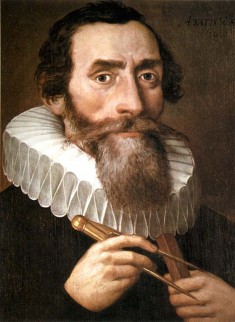A number of great minds emerged during the Scientific Revolution of the 17th century. Among those great minds was Johannes Kepler, a man who was highly skilled and visionary in such areas as mathematics, astrology, and astronomy. Among his greatest achievements was the formulation of the visionary eponymous laws of planetary motion, which was built upon to great success by other astronomers in later years.
Early Life and Education
Johannes Kepler was born on December 27, 1571, in the Weil der Stadt locality of the Holy Roman Empire. While his family was once well-to-do, by the time young Kepler was born, the family’s fortunes had gone into great decline. In fact, his father was earning money as a mercenary and is believed to have died in the brutal Eight Year’s War. His mother, an herbalist, was actually put on trial for witchcraft at one point.
Kepler developed a tremendous love for astronomy at a very young age. Likely, his observation of the Great Comet of 1577 contributed tremendously to this lifelong love. Even as a very young man, he invested a significant amount of time studying and learning about astronomy. He had found his life’s calling and ended up pursuing it with great enthusiasm.
University Years
As a young man, he attended the University of Tübingen and excelled greatly in his studies. Philosophy was one very critical discipline he studied. In time he became an enormously skilled mathematician. Certainly, his skill at math would help him greatly when he became an astronomer. It also helped him secure a career later in his life.
During his time at the university, he studied two major areas of learning that proved to be enormously helpful to his later career. These areas of study centered on learning the Ptolemaic system and the Copernican system of the motion of planets.
Kepler went on to accept a teaching position as a mathematician. He would not be one to rest on his academic accomplishments. Instead, he built upon them as evidenced with the many revolutionary written works he would go on and publish.
The Mysterium Cosmographicum
 The Mysterium Cosmographicum is the first work Johannes Kepler would publish as related to the field of astronomy. In English, the title translates as The Cosmographic Mystery. The substance of the work was intended to promote the Copernican system and offer a better defense of it to those who were critical. Critics did not necessarily wish to disprove it, but not everyone was in full agreement of it. Interestingly, Kepler looked at the Copernican system from a theological perspective. He saw it as the manifestation of God’s plan for the universe.
The Mysterium Cosmographicum is the first work Johannes Kepler would publish as related to the field of astronomy. In English, the title translates as The Cosmographic Mystery. The substance of the work was intended to promote the Copernican system and offer a better defense of it to those who were critical. Critics did not necessarily wish to disprove it, but not everyone was in full agreement of it. Interestingly, Kepler looked at the Copernican system from a theological perspective. He saw it as the manifestation of God’s plan for the universe.
After the publication of this work, Kepler began to plan further publications. He envisioned four more works that would build upon what he had written about in The Mysterium Cosmographicum.
Leaving His Teaching Post
Kepler was a Lutheran and, as religious tensions increased, he was forced to leave his teaching post in Graz. While dejected, he was able to find work in Prague as an assistant to the great mathematician and astronomer, Tycho Brahe. Over time, Kepler would rebuild his reputation and take over Tycho’s position as Imperial Mathematician when the astronomer passed away.
Shortly thereafter, Kepler published Astronomia Nova, which was his first work revealing his theories on the first two laws of planetary motion. After he was forced out of Prague due to being a Lutheran (the religious troubles had spread through Europe), he published the Harmonices Mundi. This work detailed his third law of planetary motion.
Legacy of Johannes Kepler
The legacy of Johannes Kepler is a proud one. His works had an incredibly profound effect on future astronomers and physicists and they would build on his work. Most impressively, he was a huge influence of Sir Isaac Newton and Newton based much of the theory of universal gravitation on the foundation created by Kepler.
Johannes Kepler died on November 15, 1630, in Bavaria. He had been suffering from a serious and acute illness. After his passing, his work continued to live on through the work of later astronomers who came after him.
